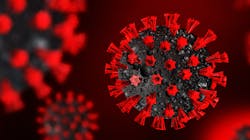SARS-CoV-2 viral mutations: Impact on COVID-19 tests
The SARS-CoV-2 virus has mutated over time, resulting in genetic variation in the population of circulating viral strains, also called lineages.
This genetic variation may impact the virus's properties such as transmission (for example, it may spread more easily) or the severity of symptoms on infected individuals (for example, it may cause more severe disease).
The presence of mutations in the SARS-CoV-2 virus in a patient sample can potentially impact test performance. Molecular, antigen, and serology tests are affected by viral mutations differently due to the inherent design differences of each test. The impact of mutations on a test's performance is influenced by several factors, including the sequence of the variant, the design of the test, and the prevalence of the variant in the population.
The FDA has collaborated with stakeholders to better understand the public health impact of new SARS-CoV-2 variants and their impact on test performance, has been routinely monitoring publicly available databases, and has coordinated efforts to evaluate the impact of new virus variants on tests that have received Emergency Use Authorization (EUA).
Clinical laboratory staff and healthcare providers should be aware that COVID-19 diagnostic tests are generally designed to detect all known variants. However, they are typically not able to identify the specific type of SARS-CoV-2 variant (such as delta or omicron) present in a patient sample. The FDA continues to conduct analyses to identify tests for which performance may be impacted for known SARS-CoV-2 variants.
Clinical laboratory staff and healthcare providers should be aware that false negative results may occur with any molecular test for the detection of SARS-CoV-2, particularly if a mutation occurs in the part of the virus' genome assessed by that test.
Changes in the viral genome can result in changes to viral proteins and, therefore, can also impact the performance of an antigen or serology test.
The FDA recommends clinical laboratory staff and health care providers who use SARS-CoV-2 tests note the following:
- Genetic variants of SARS-CoV-2 arise regularly, and false negative test results can occur.
- Consider negative results in combination with clinical observations, patient history, and epidemiological information.
- Consider repeat testing with a different EUA-authorized or FDA-cleared molecular diagnostic test (with different genetic targets) if COVID-19 is still suspected after receiving a negative test result.
- Test performance may be impacted by certain variants.
- Tests with single targets are more susceptible to changes in performance due to viral mutations, meaning they are more likely to fail to detect new variants.
- Tests with multiple targets are more likely to continue to perform as described in the test's labeling as new variants emerge. Multiple targets means that a molecular test is designed to detect more than one section of the SARS-CoV-2 genome or, for antigen tests, more than one section of the proteins that make up SARS-CoV-2.

